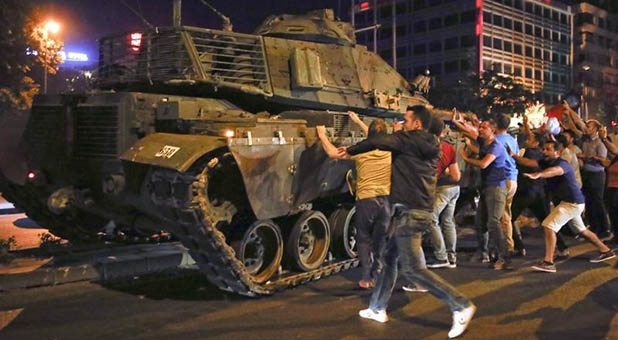The Latest on the Failed Coup Aftermath in Turkey
As Turkey continues to restore order following Friday night’s failed military coup, the government reportedly suspended thousands of police officers Monday, widened its purge of the armed forces and judiciary, and continued to raise concerns that it was abandoning the rule of law.
The key NATO member, which straddles the divide between Europe and Asia, has removed approximately 8,000 police officers from their posts on suspicion of links to Friday’s coup attempt. Thirty regional governors and more than 50 high-ranking civil servants have also been dismissed.
Not only is Turkey a key ally in NATO, but its strategic position has made it a major contributor to the war against ISIS. Secretary of State John Kerry told CNN’s Jake Tapper on Sunday the coup and the temporary shut-down of airspace around Incirlik Air Base in Turkey have had little impact on that fight.
“According to our commanders, there may have been a minor delay here or there or something, but it has not affected the fundamental direction or commitment to the fight,” he said.
That may have been a bit of a diplomatic response. According to the Pentagon, the base is now at its highest threat level—Force Protection Condition Delta—and remains operating on internal power after local officials cut commercial power to the base on Saturday.
Pentagon spokesman Peter Cook said that now that airspace has been reopened, counter-ISIS air operations have resumed. He said base operations are not being affected by the loss of power.
Earlier in the weekend, he said the U.S. was working to “fully account for all Department of Defense personnel in Turkey,” but said it appeared everyone was safe and secure. Incirlik houses NATO’s largest stockpile of nuclear weapons—specifically, the B-61 “hydrogen” bomb. Of the 180 weapons deployed with NATO in Turkey, Germany, the Netherlands, Belgium, and Italy, nearly a third are housed at Incirlik.
The B-61’s yield can be adjusted based on the intended target from 0.3 kilotons to 170 kt. By comparison, the nuclear blast that destroyed Hiroshima near the end of World War II had a yield of approximately 15 kt.
The Turkish government suspects a self-exiled Muslim cleric named Fethullah Gülen masterminded the coup. Gülen, considered a “moderate” Muslim who has been pressing for interfaith dialogue among “the people of the Book”—Christians, Jews and Muslims—was a former ally of Turkish president Recep Tayyip Erdoğan prior to 2013.
Erdoğan accuses Gülen of being behind an effort at that time to have the Islamist Justice and Development Party removed from power on corruption charges. It is believed Friday’s coup was triggered early because the government had found out about it and was about to crack down on the conspirators.
Gülen, however, claimed the coup may have been staged by Erdoğan’s government to provide cover for a further crackdown on constitutional rights in the country, and a purge of the cleric’s supporters from state institutions.
Erdoğan has demanded the U.S. hand over Gülen. Kerry told Tapper on Sunday that no formal request has been made.
“That has to come in a formal package. It has to come with documentation for the request and go to the Justice Department, and we will deal with it,” he said. “I made it very, very clear to the Foreign Minister of Turkey yesterday, the United States is not harboring anybody. We’re not preventing anything from happening. We’ve never had a formal request for extradition. And we have always said give us the evidence, show us the evidence. We need a solid legal foundation that meets the standard of extradition in order for our courts to approve such a request.
“So we’re waiting for that. They tell us they are putting it together and will send it to us. But we think it’s irresponsible to have accusations of American involvement when we’re simply waiting for their request, which we’re absolutely prepared to act on if it meets the legal standard.”
The aftermath of the coup has been difficult for the Turkish people. More than 290 people died and another 1,400 people were wounded across the country, and nearly 3,000 military officers have been detained.
“I want the death penalty” was the leading hashtag on social media in Turkey on Sunday; the country doesn’t have capital punishment. Erdoğan, however, said that may soon change in light of the failed coup.
“We cannot ignore this demand,” he told a chanting crowd outside his house in Istanbul late on Sunday. “In democracies, whatever the people say has to happen.”
The international reaction has been a unified call for Erdoğan and his government to “respect the rule of law.” But the coup, which ostensibly had the purpose of restoring Turkey’s secular constitutional government, may have only provided more reason for the Islamist government to tighten its grip on the country.
Prior to Friday, Erdoğan was accused of already dismantling press freedom, taking control of the judiciary, and taking control of the military forces. And while many of the nation’s 80 million people are opposed to his government, a majority wanted to see those changes made through democratic processes, not bloodshed.
















































